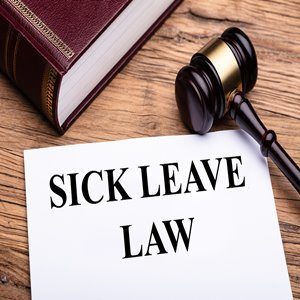On March 11, the Senate blocked a proposal to provide Americans with two weeks of emergency paid sick leave.
While similar proposals have come before Congress for decades, as the threat of coronavirus escalates, federal lawmakers’ longstanding failure to act has become more consequential than ever.
Because of this inaction, the U.S. has fallen behind the rest of the world — our data shows that we’re now one of just 6 percent of countries globally without paid sick days. A national policy remains critical, but we can’t afford to wait: The time is now for states and cities to lead on leave.
Every leading public health group recognizes that the first step in addressing an epidemic is reducing exposure. The World Health Organization has instructed those in areas where the coronavirus is spreading — 73 countries and counting — to “stay at home if you begin to feel unwell, even with mild symptoms such as headache and slight runny nose.”
The Center for Disease Control and Prevention’s guidance on coronavirus urges workplaces to “actively encourage sick employees to stay home.”
Since some people with the coronavirus experience few or mild symptoms and therefore may not know they’re sick, paid sick leave alone cannot fully quell the infection’s spread — but without it, prevention will be impossible.
With no vaccine in sight, it’s essential that we take the steps that are already available to us to reduce the threat. Ensuring that every person with a respiratory illness can stay home from work is a proven and commonsense measure that would save lives.
Eleven U.S. states and 22 cities and counties already provide sick leave. This number includes some of the strongest economies, such as the state of California and New York City. There’s no reason all cities and states can’t do the same.
Since infections spread locally, providing sick days at the city or state level would have immediate impact on containing the coronavirus threat. Research shows that existing policies have already improved community health. One study of city-level sick leave laws found that they reduced seasonal flu infections by around 40 percent — preventing about 3,000 cases of flu per 1 million residents.
Still, when it comes to public health, the details of sick leave policies matter. Ensuring workers can take paid leave beginning on the first day of illness — a feature of 72 percent of countries’ sick leave policies — is critical to reducing the risk of contagion.
Currently, several of the countries experiencing the worst outbreaks — including Iran and Italy — require workers to take several days of unpaid leave before their benefits kick in, which may reduce the likelihood they’ll call in sick when they need to.
Similarly, allowing new employees to take sick days, rather than limiting eligibility to those who’ve been in a job for a minimum amount of time, helps prevent illness from spreading though workplaces.
Further, it’s essential that these policies be as inclusive as possible. Even for those lucky enough to have employer-provided leave, the U.S.’ failure to cover everyone puts us all at risk in our day-to-day lives.
Workers who can least afford to take unpaid leave are also the least likely to have paid time off through their employers: The restaurant worker who made your lunch; your child’s daycare provider; and the home health aides caring for your elderly parents are all disproportionately likely to lack paid sick days.
Even in states that have paid sick leave laws, gig economy workers and part-time employees are often excluded from coverage, which puts both them and their customers at risk.
Coronavirus has made the threat acute, but the consequences of this patchwork coverage are much broader: Flu season affects tens of millions each year, which has caused as many as 46,000 deaths in the U.S. just since October.
Above all, the current threat posed by coronavirus underscores how the health of one affects the health of all. Ensuring that all workers can afford to seek care and stay home when they’re sick is a proven and powerful strategy for protecting public health that has been adopted by the vast majority of countries worldwide — and it’s urgent that the U.S. join their ranks.
Meanwhile, states and cities must step up to enact paid sick leave at the local level, which would immediately strengthen their ability to respond to the current epidemic.
With more cases confirmed every day, the time to act is now.

